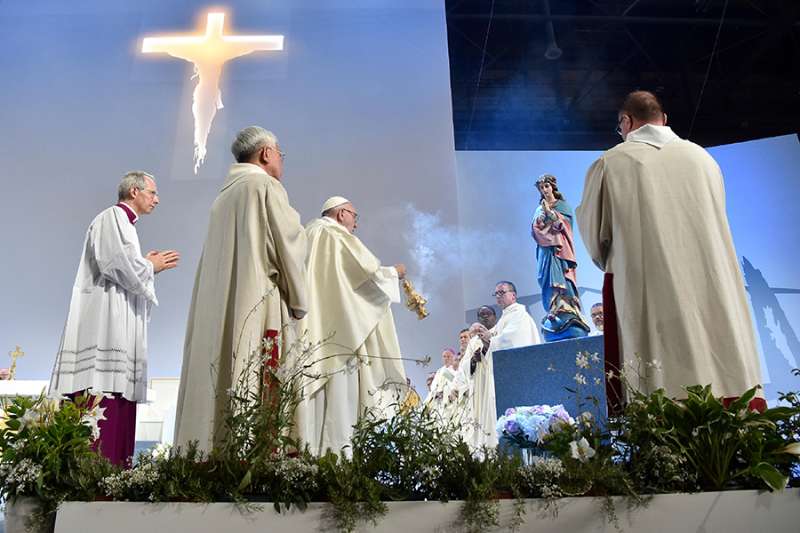The Lord’s Prayer is the prayer of the Church, confirming a person’s identity as a beloved child of God, and reminding Catholics of the responsibility owed toward their brothers and sisters in Christ, Pope Francis said Thursday.
“‘Our Father’: these two simple words offer us a roadmap for the spiritual life,” the pope said in a homily at Mass in Geneva June 21. The Mass took place at the end of a day-long trip to the Swiss city for the 70th anniversary of the World Council of Churches.
In his homily, the pope said the words “Our Father,” as taught by Jesus to his disciples in the day’s Gospel, reveal life’s meaning and a Christian’s identity: “we are God’s beloved sons and daughters.”
“Those words solve the problem of our isolation, our sense of being orphans,” he continued. “They show us what we have to do: love God, our Father, and others, our brothers and sisters. The ‘Our Father’ is the prayer of us, of the Church.”
Referring to how Christians call God “our Father,” he said in the face of offenses against God, Catholics are called to overcome indifference and to treat everyone as brothers and sisters: including the unborn, the elderly, the person who is difficult to forgive, the poor, and the outcast.
“This is what the Father asks us, indeed commands us, to do: to love one another from the heart, as sons and daughters in the midst of their brothers and sisters,” he said.
Catholics are reminded of God as Father also when they make the sign of the cross, he continued, noting that “where the Father is present, no one is excluded; fear and uncertainty cannot gain the upper hand.”
In his homily, Francis also reflected on the images of bread and forgiveness in the Lord’s prayer, stating that when Christians ask God for “our daily bread,” they are asking the Father to help them live a simpler life, focusing on what is most important, like “people over things so that personal, not virtual, relationships may flourish.”
The pope criticized the complication of today’s daily life, noting how many people rush “from dawn to dusk, between countless phone calls and texts,” filled with stress and preoccupied by change, with no time to see the faces of others.
He advised choosing a simpler lifestyle, one which “goes against the tide,” and pointed to St. Aloysius Gonzaga, whose feast day is celebrated June 21, as an example. Such lifestyle “would involve giving up all those things that fill our lives but empty our hearts,” he said.
Catholics must also not forget that Jesus himself is their “daily bread,” the pope said, criticizing the treatment of Jesus as a “side dish,” rather than as the center of the day and “the very air we breathe.”
Also reflecting on the element of forgiveness found in the Our Father, Francis stated that God frees the heart from all sin when he “forgives every last thing. Yet he asks only one thing of us: that we in turn never tire of forgiving.”
And if a person finds it hard to forgive someone, he should pray for that person and for that situation, asking God for strength, he advised.
“Let us ask for the grace not to be entrenched and hard of heart, constantly demanding things of others. Instead, let us take the first step, in prayer, in fraternal encounter, in concrete charity,” he concluded. “In this way, we will be more like the Father, who loves without counting the cost.”

